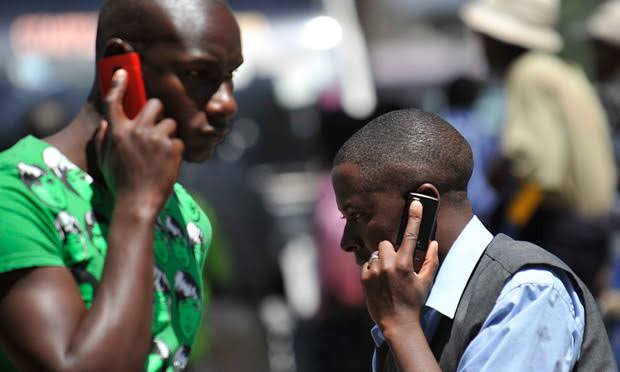
By Steven Kefas
Reactions have continued to trail the decision of the Nigerian government to shutdown telecommunications network in states affected by terrorism in the North-West region of the country. States such as Katsina, Zamfara, Sokoto, Kaduna and even neighboring Niger in the North Central have had telecommunications network shutdown in several local government areas.
The Nigerian Communication Commission (NCC), the agency saddled with the responsibility of overseeing and managing all communication architectures in the country ordered the shutdown of telecommunication networks in early September 2021 citing the war against terrorists elements in the region as yardstick.
In Katsina state, the President’s home state for example, at least 13 local government areas believed to be under the control of terrorists had telecommunications network shutdown since early September. This came after initial denial from the NCC that such was going to happen.

Neighboring Zamfara state also shutdown telecommunications network in the entire state for several weeks while Sokoto state did the same for 14 local government areas.
Niger state and also Kaduna state implemented network shutdown in parts as telecommunications networks in several local government areas were also shut down all in the guise of fighting terrorists.
While the states and federal government wants Nigerians to believe that the network shutdown is actually achieving the desired results, the realities on ground prove otherwise as the terrorists have not relented in their nefarious activities since the shutdown.
Even though the shutdown may have achieved some results in terms of diminishing the terrorists’ capacity to operate, the demerits outweigh the merits as over 300 people have been killed across the five troubled states of Katsina, Sokoto, Zamfara, Kaduna and Niger since the shutdown was implemented in September. A figure many like myself believe to be too high considering the fact that a much publicised military operation is ongoing in the region.
Abductions have also continued unabated as the terrorists have devised means of communication such as using satellite phones to bypass the effects of the shutdown or using network architectures in Niger Republic to carry out their operations.
In an interview with dailytrust, a popular Nigerian based newspaper, terrorists commander, Shehu Rekeb boasted that the shutdown of telecommunication networks in the area does not stop them from operating as they now use thuraya satellite phones which do not require the conventional GSM network to function. Rekeb also said that certain GSM networks still operate in some parts of the states where the shutdowns were in effect.
“There are places you can make calls if you have Glo aand Airtel lines,” he told the Daily Trust September 13. This further raises questions on the sincerity of the telecommunications network shutdowns in the area.
A resident of Zamfara who relocated to Kaduna in late September told me under the condition that his identity must be anonymous that some areas still have globacom and Airtel networks making it possible for the terrorists to still communicate and launch attacks on communities. His testimony further confirms the claim of Shehu Rekeb.
Aside from the huge negative impacts the network shutdown is having on citizens who rely on networks to carry out their daily legitimate productive activities, the shutdown has also failed to improve the security of the citizens of the region as the terrorists still carry out deadly attacks on communities almost on a daily basis. This week alone over 30 people have been killed in separate attacks in Zamfara and Katsina communities despite the ongoing military operations and network shutdown. On 26 of September, 38 people were killed by terrorists in Madamai and Abun communities in Mallagum district of Kaura local government area of Kaduna state. In the same week another 60 were killed in Sokoto and Niger communities in separate attacks.
Even the military fighting the terrorists in the North West are not exempted from the negative impacts of the network shutdown. On 11th of September 12 military personnel paid the supreme price when terrorists took advantage of the shutdown and launched a deadly attack on a forward military operation base in Mutumji, Zamfara state. Reacting to the attack, a too military source told dailytrust that the shutdown made it impossible for the troops to communicate amongst themselves when the terrorists attacked.
“While the jamming of GSM in Zamfara has gone a long way in taming the bandits, it also has a negative effect on troops because communication among them was also extremely restricted,” the source said.
“Most of the foot soldiers relied on normal phone networks instead of any of the specialised communication gadgets that should be deployed during operations such as the one going on in the North West.
“Only the top commanders have military radio or walkie-talkie, meaning those in the frontlines would only use their personal mobile phones which are no longer accessible.
“The bandits took advantage of this and attacked them at their forward operation base. As you can see, the attack was launched on Saturday but it only came to the fore days after,” he said. Another source said there was the need to deploy specialised communication gadgets for the troops.
“The ban on communication in Zamfara and parts of Katsina is not bad in its entirety but the military high command should have taken note of the adverse effect on troops.” The military source said.
In the same vein, another security source told Dailytrust in September that the telecommunications network shutdown was not ‘well-thought-out and bypassed the due process of getting clearance from the National Security Adviser (NSA), Babagana Monguno, who oversees cyber security’.
In as much as some sessions of the Nigerian media would want to paint a scenario that the network shutdown and ongoing military operations in the North-West have achieved the desired results, citizens in the areas are daily counting their losses in the forms of burying their loved ones and inability to even send SOS calls when under terrorists attacks due to absence of telecommunication networks in the area.
Socioeconomic activities that rely solely on telecommunication network facilities to function have also been crippled in the region forcing many to be out of jobs in an economy where inflation is currently on an all time high.
The Federal government must as smarter of urgency and national importance review the ongoing suspension of telecommunication networks in the North-West region to ensure necessary measures are out in place to achieve maximum results.
Dealers of the so-called thuraya satellite phones in the country must be investigated and possibly prosecuted for aiding and abetting terrorists activities in the country.


